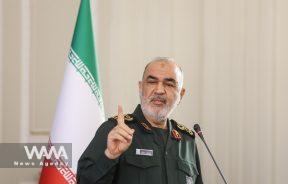Araqchi: I Am Committed to the Strategic Action Law, Not a Member of the “New York Group”
WANA (August 12) – Ebrahim Rezaei, speaking to reporters about the session of the National Security and Foreign Policy Commission of the Islamic Consultative Assembly held on Monday morning (August 12, 2024), which was attended by Seyed Abbas Araqchi, the proposed Foreign Minister, said: In this meeting, the proposed Foreign Minister first outlined his biography and career background, then presented his plans and views if he were to assume this role, and answered the questions of the commission members.
He added: Araqchi stated that he considers himself a soldier of the Imam and the Leader and has tried to remain steadfast on this path. He also referenced his background in the Islamic Revolutionary Guard Corps (IRGC) and his 40-year experience in foreign policy and the Ministry of Foreign Affairs.
The spokesman for the National Security and Foreign Policy Commission noted: The proposed Foreign Minister emphasized that he has not and will not get involved in factionalism and has worked with all previous Foreign Ministers. He also mentioned that during the 13th administration, he was an advisor to the martyred Amir Abdollahian, who intended to utilize his services. Araqchi outlined his program, which is the result of 40 years of experience in foreign policy, and named it “Comprehensive, Active, and Effective Foreign Policy.”
The spokesman continued: Araqchi identified the primary mission of foreign policy as securing national interests, preserving and increasing national wealth, strengthening national security, enhancing the country’s power, and maintaining dignity and national prestige.
Rezaei also discussed another aspect of Araqchi’s remarks regarding national interests, stating: One of his plans in this regard is economic diplomacy, meaning that foreign policy should serve the progress and economic development of the country.
He added that, according to Araqchi, economic issues are a priority for the country’s diplomatic apparatus, and the Ministry of Foreign Affairs should break barriers and pave the way for economic matters. In this regard, inward-looking and outward-looking economic diplomacy, relying on technological knowledge, should be on the ministry’s agenda.
Neighborly Relations Will Continue
The spokesman mentioned that another key aspect of the proposed Foreign Minister’s plans is good neighborly relations, stating that Mr. Araqchi said that the martyred President Raisi’s administration worked powerfully in this area, and they will continue this path.
He also noted that they will use the capacities of international and regional organizations, expand diplomatic fields, and utilize the capacities of Africa, Latin America, and East Asia. Prioritizing relations with China and Russia was also mentioned as key working priorities.
Regarding Araqchi’s perspective on Europe, Rezaei said: The proposed Foreign Minister explained that in Europe, he advocates for dignified and opportunity-driven engagement from a position of equality and based on reciprocity. Regarding the United States, he stated that managing hostility and adopting policies to counter the hostile actions of the U.S. and the Zionist regime are part of his program.
He emphasized that it is not possible to eliminate hostility with the U.S., but it must be managed. Utilizing the capacities of foreign policy to neutralize sanctions and working towards the honorable removal of unilateral sanctions are also on the agenda.

Abbas Araghchi, a former member of the nuclear negotiating team (L) and Amir Abdullahian, Iran’s foreign minister (R). Social Media / WANA News Agency
No Division Between the Field and Diplomacy; They Are United
Regarding national security and power enhancement, Araqchi explained that he does not believe in a separation between the field and diplomacy; they are united and must achieve results together. Achievements in the field should be translated into wealth, power, and security in diplomacy, and diplomacy without the field has no strength.
Mr. Araqchi also emphasized that negotiations must be based on power, and in the new world order, if we do not determine our position, others will do it for us.
Rezaei also noted that in terms of maintaining dignity and enhancing prestige, the third strategy of the diplomatic apparatus, the proposed Foreign Minister emphasized the advancement of parliamentary diplomacy and the use of all elements. Regarding the necessary conditions, he said that the most important requirement is national consensus, as foreign policy will not progress without national unity and solidarity.
He also stressed that a more significant spirit of jihad must be injected into the Ministry of Foreign Affairs.
He added: Mr. Araqchi, in response to the commission members’ questions, stated that his approach to diplomacy is based on power and generating power, and his worldview remains the same as when he was in the IRGC, as one cannot engage in discussions without having elements of power.
I Am Not Part of the “New York Group”
In response to a question from the proposed Foreign Minister about whether he is part of the “New York Group,” he clarified: He is not a member of the “New York Group,” though he has no judgment about it.
The spokesperson for the Parliament’s National Security Commission emphasized: Regarding the Strategic Action Plan and its implementation, the proposed Minister stated that the Strategic Action Plan for the lifting of sanctions is mandatory and must be adhered to.
If honorable negotiations take place, they will be within the framework of this law. He mentioned that he initiated and progressed the negotiations to revive the JCPOA in 2021 within the confines of this law, which has strengthened our position.
Rezaei added: Mr. Araqchi stressed the importance of consulting with the Islamic Consultative Assembly, stating that the conditions have changed and the outcome of the negotiations is uncertain. Regarding the structure of the Ministry of Foreign Affairs, he explained that they aim to reform it because the current structure has not been very successful.
He also emphasized the need to revive the Foreign Ministry’s school for training diplomats, noting that the Ministry of Foreign Affairs is ideologically driven.












